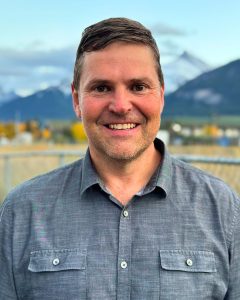Glenn Peterson, senior director of church planting, sat down with the Companion to talk about his passion for renewal, humility, and Spirit-led imagination.
Can you tell us about your transition from being superintendent of the Evangelical Covenant Church of Canada to leading the denominational work in church planting?
I honestly thought my previous role was where God had called me to finish out my ministry. I felt deep joy in walking with pastors and congregations across the country, helping them discern what faithfulness looked like in their communities.

Then last May, I was in Chicago with the Council of Superintendents, which was around the time Alex Rahill announced he was stepping down from his position as senior director of church planting. During our gathering, Paul Lessard, who was serving as vice president of mission priorities, led a devotional on Ezekiel 37, the passage about the valley of dry bones.
I can’t fully explain it, but it was one of those holy moments where the Spirit speaks so clearly that you know you’ll never forget it. Sitting in that meeting room at 8303 W. Higgins, I felt God pressing in. The text about dry bones came alive—God’s desire to breathe new life into places that feel weary or lifeless.
After the day was over, I called my wife, Bekah, and said, “I think we need to be open to this.” For us, that meant not just a career move; it was a weighty discernment. We have four children, all born in Canada. Even though the US border can look invisible on a map, in reality, it represents two distinct nations, with distinct cultures, systems, and rhythms of life. For our family, this move meant leaving behind familiar patterns and asking big questions about where God wanted us to be.
There was also this phrase that came up in that superintendent gathering: “It starts with us.” At first, it might sound arrogant, but it was really about responsibility. We cannot call the wider Covenant to renewal if we as leaders aren’t willing to go there ourselves. That stuck with me. It meant sacrifice, but it also meant opportunity—to invest in the renewal, health, and flourishing of the Covenant through the avenue of church planting.
After your three decades of ministry largely centered in Canada, how does that perspective impact your approach to church planting?
That’s a big question. I grew up in the US, but I spent 30 of my most formative adult years in Canada. That inevitably shaped me.
One of the first things that drew me there was a broader sense of global awareness. In general, Canadians carry a perspective that is less isolationist and more collaborative. The United States tends to operate as a superpower, assuming a central role in global dynamics. Canada, by contrast, is more like a third power—it knows it’s not the dominant voice on the world stage, so it has to listen more. I hope that listening posture, that sense of humility, has rubbed off on me.
There’s also the cultural difference between “mosaic” and “melting pot.” When people immigrate to Canada, they are encouraged to retain and celebrate their cultural distinctives. That diversity is seen as a strength. In the US, the expectation often leans toward assimilation—you come here, and now you become American. Neither approach is perfect, but living in Canada taught me to value and celebrate cultural differences.
I also think of curiosity. Historically, Canada has leaned toward listening first, speaking second. To be fair, polarization is rising in Canada just as it is in the US, and curiosity has taken a hit everywhere. But that instinct to listen—to assume you’re not the most important voice in the room—remains a Canadian cultural value, and I think it’s a kingdom value too.
And then there’s collaboration. Canadians love words like “collaboration” and “partnership.” The idea is not just seeking your own welfare but seeking the welfare of your neighbors who are both near and far. That overlaps directly with the gospel vision of loving God and neighbor, caring for the common good, and participating in the kingdom.
People sometimes tell me I sound different. They’re not talking about my accent; they’re sensing my posture. After 30 years, those values—humility, listening, collaboration—have become ingrained in me. And I think they’re deeply needed in the Covenant right now, because we’ve come through a disruptive and disorienting season. We need leaders who listen for the Spirit, who listen to each other, and who approach renewal with humility.
What does that humility mean in the context of church planting?
Earlier this year, I attended the Alpha Conference in London. I was stunned by what I experienced of God’s Spirit at work in the global church. At one point, as I prayed with friends, my heart’s cry was, “God, break us of our self-sufficiency.”
That’s the heart of it. In North America, especially in the US, we prize independence, achievement, and getting things done. There’s beauty in that. But there’s also a shadow side. If we believe everything depends on our strategies, our charisma, or our models, then what need do we have for God?
Church planting must begin with dependence on the Holy Spirit. Our entrepreneurial drive is not enough. The truth is, we’ve had 25 to 30 years of beautiful church planting in the Covenant—our leaders and planters have done faithful work. But often we’ve operated as though if we just got the model right and recruited the right leader, the church would thrive.
I believe we need to ask a different question: “Lord, what new thing do you want to do among us?” That requires humility, imagination, and surrender.
I often use jazz as a metaphor. Jazz is improvisational. It honors structure, but it also invites creativity. When musicians gather, the question is, what new song needs to emerge here, in this moment, with these people? Church planting is similar. God is giving new songs to his people. Our job is not to force the tune we already know, but to listen and improvise with the Spirit.
To hear more from Glenn, don’t miss the latest episode of Hope of the Gospel, where he talks with Ieisha Hawley about practical hope for a new generation.
You have said the church planting model can sometimes put planters at risk. What do you mean by that?
If we focus too heavily on the entrepreneurial planter, we end up placing enormous pressure on individuals to carry something they were never designed to carry. It creates environments where planters feel they have to succeed at all costs.
That pressure has contributed to the burnout and even moral collapse we’ve seen in parts of the wider church world. Thankfully, the Covenant has avoided some of the most high-profile scandals, but we’re not immune to the underlying dynamics.
I believe part of the problem comes from equating church planting with the church growth movement. In the 1980s and 1990s, the unspoken assumption was that bigger is better, faster is better. That led to situations where pastors were forced to live double lives—projecting strength while hiding brokenness.
We need a healthier vision. We need to root church planting in our Covenant affirmations: the centrality of God’s Word, the necessity of new birth, the whole mission of the church, the conscious dependence on the Holy Spirit, and freedom in Christ. If those aren’t shaping our planting movement, then we’re missing the point.
What does that healthier vision look like in practice?
For me, it looks like every Covenant church embracing one of three postures: you’re a plant, you’re planting, or you’re a partner.
If your church is under 10 years old, you’re a plant. If you’re actively involved in launching new work, you’re planting. And if you’re not doing either, then you partner. Partnership can look different in every context. It could be as simple as identifying a church plant within three hours of you and committing to pray for them once a month. It could mean sharing space, providing financial support, or mentoring leaders.
Another piece is incubation. I would love to see one to three established churches in every conference serve as hubs—incubators for planters. Those churches could offer residencies, internships, and opportunities for younger leaders to test their gifts. We need spaces where Gen Z leaders, in particular, can emerge and be shaped.
We also need to broaden our definition of church. Too often, we default to a Sunday-centric, worship-centric model. Worship matters deeply, but so do discipleship and mission. What if 12 people gathered weekly for prayer, worship, discipleship, and mission in their neighborhood—that’s church. Maybe it doesn’t fit our traditional metrics, but maybe it’s exactly the new wine God is pouring out.
That requires humility. Instead of our telling God, “Here’s what church must look like,” we ask, “God, what are you already doing? How can we support it?”
What would you say to a pastor who doesn’t see themselves as a church planter?
That’s okay! Not everyone is called to plant. But every church can still be involved.
I’d encourage pastors to pay attention to the fruit in their communities. Are people being discipled? Are leaders being developed? Is there overflow? Often, that overflow naturally gives birth to something new—whether a ministry, a new project, or eventually a new church.
If you don’t feel called to plant, then partner. Ask, how can we support what God is doing elsewhere? How can we encourage those stepping into new work? Sometimes that’s prayer, sometimes it’s offering resources, sometimes it’s sharing wisdom. But no church is excused from participating in the mission of planting.
As you look ahead, what vision are you carrying into this role?
My vision is simple and yet demanding: that we trust God to breathe new life into dry bones.
I don’t believe church planting is about saving an institution. It’s about renewal. It’s about joining God’s creative work. It’s about humility, listening, dependence on the Spirit, and courage to imagine new possibilities.
I want us to become a community where every church sees itself as part of planting—whether directly or in partnership. A community that nurtures young leaders, especially from Gen Z, and creates room for their gifts. A community that takes our affirmations seriously—not just as theological statements but as practical guides shaping our planting movement.
Most of all, I want us to become a community that believes our best days are still ahead. Not in a simplistic, “everything grows up and to the right” way, but in a deep, faithful, Spirit-filled way. God is doing a new thing. The Spirit is still at work. And we get to join in.
That’s the vision that excites me, humbles me, and keeps me hopeful.
Learn how renewal is taking root across the Covenant—and find your next faithful step—at covchurch.org/renewal.














